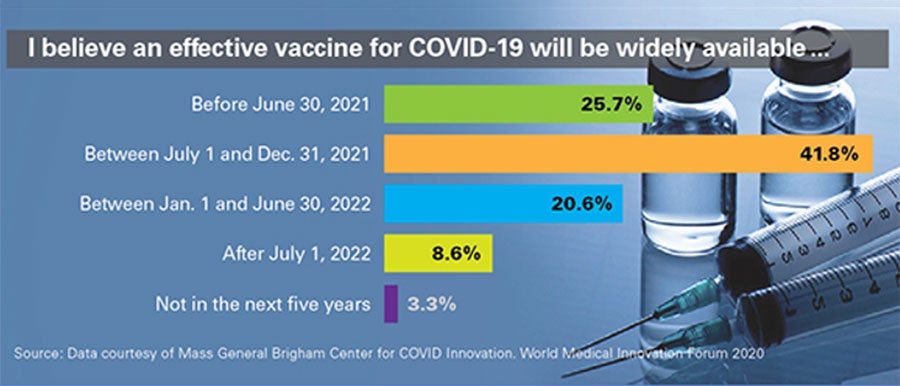
COVID-19
Experts Analyze Health Care’s Near- and Long-Term Operations
Survey results on COVID-19 vaccines, testing, and health care access and research
Editor’s note: These items originally ran in the AHA Center for Health Innovation Confronting Coronavirus newsletter on May 26, 2020. The Confronting Coronavirus newsletter, a temporary replacement for the Center’s Market Scan newsletter, focused on the latest solutions and strategies hospitals and health systems are deploying during the pandemic. Market Scan provides insights and analysis on the field’s latest developments in health care disruption, transformation and innovation. To subscribe, please click here.
Leaders Expect Bumpy Road Ahead
The U.S. economy has started to reopen as the impact of COVID-19 gradually subsides, but four of five senior health care leaders surveyed recently expect a significant spike in cases in their regions by fall, and more than 74% do not believe an effective vaccine will be widely available until after July 1, 2021. However, nearly 61% believe an effective testing system will be offered by multiple providers in their areas between July and the end of this year.
These were just a few of the findings from a survey of more than 1,200 senior global health care leaders who took part in the World Medical Innovation Forum, hosted by Mass General Brigham. Survey participants — CEOs, CMOs, physicians, researchers and others — also expect COVID-19’s impact on society to be deep and long-lasting. Fully half of respondents expect society to be materially diminished (e.g., structural unemployment, reduced optimism), while 39% expect it to improve with a greater focus on wellness and a sense of community.
Respondents also are convinced that over the next five years, both private and government-funded investment in infectious disease research and monitoring will increase. And more than four out of five respondents expect funding to increase by 10% or more in these areas.
9 Ways Virus May Turn U.S. Health Care On Its Head
STAT recently surveyed a host of prominent health policy experts — top health advisers to both Republican and Democratic presidents, lawmakers, executives, physicians and top lobbyists — who forecast a new status quo that they believe will upend what American health care looks like for decades. Among their predictions: The pandemic could help bring about an end to the American tradition of tying health insurance to employment status. It could prompt a reckoning about why African Americans and other historically marginalized populations have long suffered so disproportionately — not just from COVID-19, but from nearly every common health condition. And it could represent the beginning of the end for the very concept of nursing homes and assisted-living facilities.
